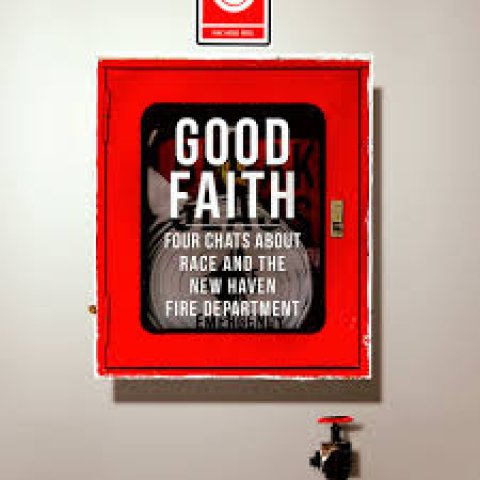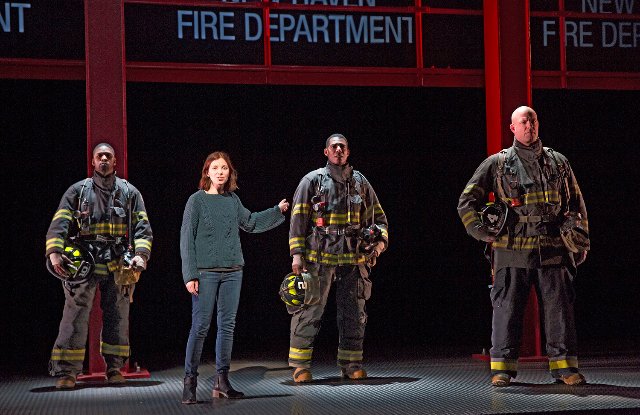A New Work by Yale Drama Graduate Karen Hartman
Good Faith – Four Chats about Race and the New Haven Fire Department
By: Karen Isaacs - Feb 21, 2019
Good Faith – Four Chats about Race and the New Haven Fire Department now having its world premiere at Yale Rep through Saturday, Feb. 23 fits into the category of documentary theater. It is also referred to as theater of witness or theater of fact.
This form combines elements of documentary – reliance of interviews, documents, media reports of an event. Often the words of the people are not changed in any way. The story is told in the words of those involved either directly or peripherally.
This form has existed for centuries, but it is only in the last 30+ years, that it has become a popular form in the U.S. The best known of these are the works of Anne Deavere Smith (Twilight, Los Angeles, 1992 and Fire in the Mirror) and the plays The Exonerated (about people falsely sentenced to death row) and The Laramie Project about the killing of Matthew Shepherd.
This new work by Yale Drama graduate Karen Hartman was commissioned by Yale through its Theatre Development Project. Its subtitled Four Chats about Race and the New Haven Fire Department. Hartman fudges the issue somewhat by calling it a work of dramatic fiction that takes inspiration from the events.
The basis for the work is to look back in 2015 and 2017 at promotional exams in the New Haven Fire Department. In 2002, there were only 8 promotion spots to lieutenant and the top 10 candidates were all white; for captain, the top scorers were 7 white firefighters and 2 Hispanic. The race/ethnicity of the top scorers was not known until years later even to the test takers.
The Civil Service Commission refused to certify the exam results, thus putting all the promotions on hold. Some of the firefighters file suit (naming then Mayor John DeStefano as the lead defendant) claiming discrimination. The case dragged on for years until it was heard in the Supreme Court. In 2009 it body ruled in favor the firefighters. Later in the year those 2002 test results were finally certified and promotions occurred. The same year, another firefighter who had taken the test filed suit because of the weighting of the two parts of the exam – 60 percent for the written and 40 percent for the oral. Michael Briscoe, an African American firefighter had scored highest on the oral but lower on the written. The argument was that the balance of the scoring had a “disparate impact” on African Americans.
Hartman sets out to see how those involved feel about the case and its outcomes years later.
We can assume that she talked with many people, but this play focuses on just four: Karen Torre, the attorney who brought and eventually won the case; Frank Ricci the lead plaintiff; Michael Briscoe who brought the second case; and Tyrone Ewing, an African American firefighter who had also taken the exam.
It opens with Hartman giving us an amusing look at how she became involved with the process. It seems at times irrelevant (all the talk of her young son). It is designed to put us on her side as she goes about the process of recording the interviews, and observing the people.
From there, during the course of the two acts, we see Frank Ricci teaching new recruits at the fire academy, a raucous conversation between Briscoe and Ewing at a local diner with Hartman looking on, an interview/conversation with Karen Torre and finally a conversation between Briscoe and Ricci (now president of the union.).
The acting is superb as one expects at Yale. With the exception of Laura Heisler as the writer, most play one or two cameos in addition to their main role. The most dynamic performances are by Billy Eugene Jones as Mike Briscoe and Ian Bedford as Frank Ricci. Excellent work is turned in by Rob Demery as Tyrone Ewing and Rene Augesen and Karen Torre.
Like many world premieres, this is a work in progress and needs refining and probably cutting.
But a more serious concern is the structure. Hartman undoubtedly talked to many people – other firefighters involved in the suit (20 in all) and others who took the test and later were promoted. She interviewed political leaders, defense lawyers, union personnel, the Blackbirds (an organization of African-American firefighters that had sued the city multiple times), and perhaps even the general public. Why don’t we hear from them? By limiting it to these four people, we get a skewed understanding of the issues and consequences.
Instead we hear overlong debates between Ewing and Briscoe in act one. They hold very different views on many subjects. In act two the conversation between Briscoe and Ricci is also overlong. In addition, in both of these, there is so much talking over each other, that understanding is limited.
Even the conversation with Torre seems forced with an unnecessary sense of danger included.
Some of this, director Kenny Leon could have overcome. While is staging is good, the overlapping dialogue and repetition of ideas hampers understanding.
What is interesting is that the author’s sympathies are balanced among the three firefighters. You can understand and empathize with each of them. There is no clear “right side” or “wrong side’” It just seems as if all of them were injured by the situation. It would be interesting to get the reactions of the people involved and the others involved. How do they view what she presents?
Despite the flaws in this play, area residents – even if you do not live in New Haven – should see it. Once again issues of race, ethnicity and preferential treatment are part of our national discussion. With all sides presented, Good Faith gives you lots to think about.
For tickets visit Yale Rep or call 203-432-1234.
This content courtesy of Shore Publications and zip06.com.


